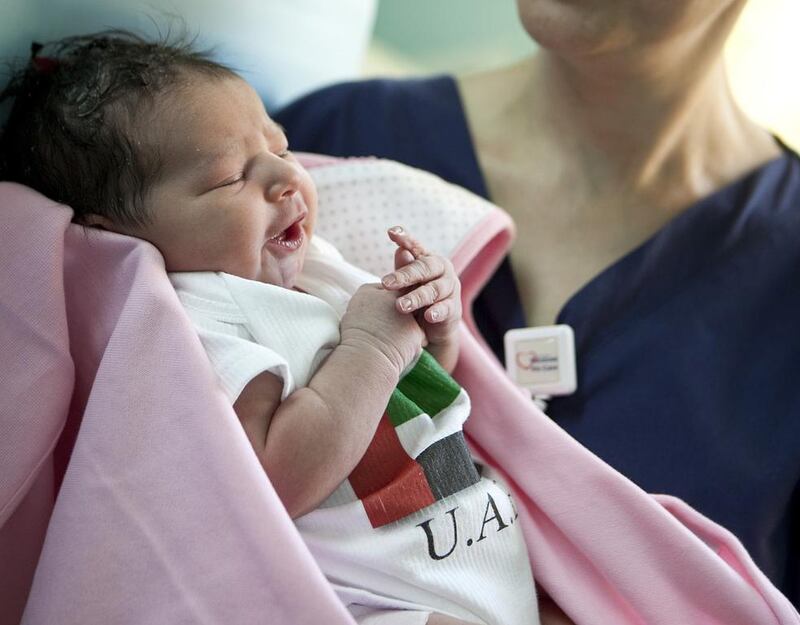Formula milk will not be allowed for sale in the UAE unless it meets strict packaging rules under a law that supports a nationwide promotion of breastfeeding.
In April, the UAE Cabinet adopted a law that regulates the marketing of infant formula, banning its advertising and introducing mandatory labels that clarify it is not a substitute for breastfeeding.
Companies that fail to comply will have their products withdrawn from supermarkets and will be banned from marketing their products in the UAE for up to a year.
The company will also be charged the cost of any damages and have their trade licence suspended.
The law, which was drafted based on the World Health Organisation’s international code for marketing breast milk substitutes, aims to encourage mothers to breastfeed their children, rather than use baby formula.
Dr Ghada Sayed, Arab world regional co-ordinator of the International Baby Food Action Network and WHO consultant, said there was “heavy resistance” from companies that produce baby formula before the resolution passed.
“These companies make more money than pharmaceutical companies,” Dr Sayed said.
“They invite doctors on paid trips abroad to attend medical conferences so that ultimately, they prescribe their products.”
This practice is banned under the new law.
Dr Sayed said the decree would help the region because many of the formula companies were based in Dubai.
“Previously a majority of the paediatric conferences in Dubai were sponsored by these companies. This decree will help us throughout the region [because many companies are headquartered in Dubai]. It will force these milk companies to cease these activities,” Dr Al Sayed said.
Companies must now also include labels that say “breastfeeding is best” on their products and ensure their marketing does not suggest that formula milk is in any way similar to or more beneficial than breast milk.
All packaging information must also be accurate, up-to-date and scientifically accurate. The next phase will be to ban supermarkets from placing promotional offers on breast-milk substitutes. Mothers have the right make informed decision, Dr Sayed said.
_______________
Read more:
No sterilising or washing up: UAE mum explains why breast feeding is best
Low breastfeeding uptake in UAE leads to calls for longer maternity leave
Noura Al Kaabi urges UAE firms to offer better maternity and work policies for new mothers
_______________
“We can’t allow these companies to claim that their product improves a child’s IQ and that it is better than breast milk,” she said.
Dr Sayed travelled to the UAE last month to host a workshop with companies and ministries that would be affected by the law to discuss how it would be implemented and enforced.
“It is a joint effort between the municipality and Ministry of Health to monitor supermarkets,” she said. “We are also counting on the community where anyone who sees a violation is encouraged to report it.
“It is important for the process to start.”
The law is the latest in a series of legislative changes that encourage women in the UAE to breastfeed their children for longer. In 2014, the UAE passed the Child Rights Law that made nursing mandatory.
An argument was made that breastfeeding was a "duty" and every infant should be entitled to be nursed as it was beneficial for health and built a strong bond between mother and child.
Also under UAE law, working mothers are entitled to two 30-minute breaks a day to breastfeed their child for the first 18 months.
Breastfeeding numbers in the UAE are lower than the global average. Figures from Unicef show only 34 per cent of mothers exclusively breastfeed their children under the age of six months. This puts the country at six per cent below the global average and 16 per cent below the World Health Assembly target of 50 per cent by 2025.
Globally, 45 per cent of mothers are still breastfeeding their children at the age of two, while in the UAE only 29 per cent of mothers do so.
Some women may choose not to breastfeed because of health, financial or emotional barriers. They may not have the support they need at work or at home that allows them the time to nurse their baby.
Others may not produce enough milk to exclusively feed the baby for the recommended six-month period.
Women are encouraged to nurse their children for up to three years.
Abu Dhabi’s main maternity centre, the Corniche Hospital, has been one of the major proponents of laws that encourage breastfeeding.
For years they have been encouraging mothers to nurse, through educational campaigns, workshops and by opening lactation clinics.
Gabriela Shaat, its lactation consultant, said the new law would stop companies from promoting their products in an “unethical way”.
“Simply by writing on formula milk that babies will sleep better if they use their products, that is unethical,” Ms Shaat said. She said mothers had told her companies approached them while they were out shopping and offered them samples of their product. Cost reduction is another reason some may choose to turn to baby formula.
“We asked about the barriers to not breastfeeding and discovered that companies have been visiting mothers, and visit doctors and give them free samples which they pass on to mothers,” Ms Shaat said.
“What happens after that is that the mother’s milk might dry up and the baby will get used to formula milk, so from a breastfeeding mother you now have a formula-fed baby.”






